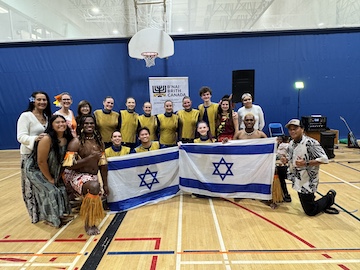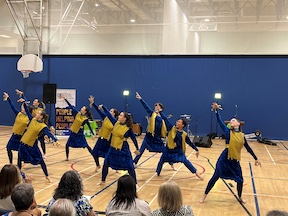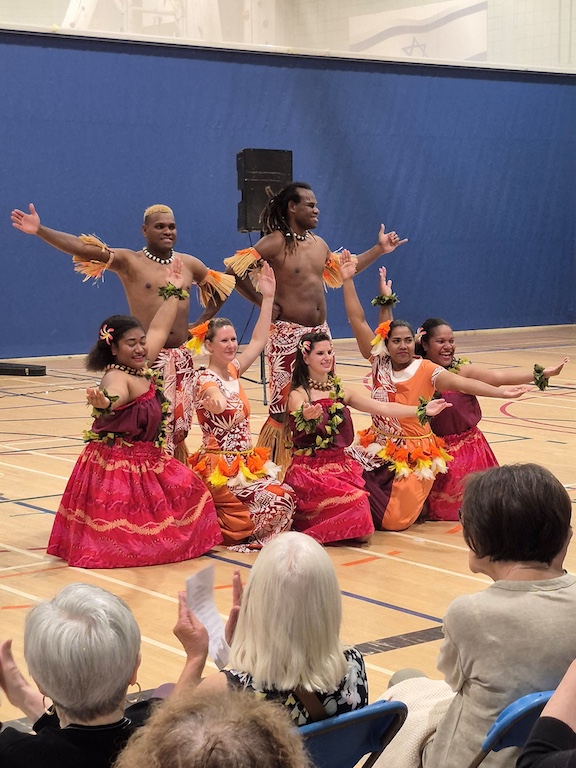Local News
The South Seas come to the Asper Campus

By MYRON LOVE On Thursday, July 24, about 150 members of our Jewish community got a chance to sample the dance and music of the South Pacific. The event was billed as “Beyachad Together – Celebrating Indigeneity, land, culture and identity.”

The program featured both the Sarah Sommer Chai Folk Ensemble dancers and Steinbach-based Island Breeze Manitoba – which describes itself as “a high energy live band & Pacific Island dance team featuring authentic outfits and dances from the islands of Hawaii, Tahiti, Fiji, Samoa and New Zealand.”
According to Dr. Ruth Ashrafi, Regional Director of B’nai Brith Canada in Manitoba, the evening’s performance was connected to an Indigenous Peoples Conference that was held in Steinbach under the auspices of Island Breeze with participants from Canada, the United States (specifically Hawaii), Antigua and Bermuda in the Caribbean, South Africa, the Philippines, Japan, Australia, New Zealand and the South Pacific island countries of Fiji, Tonga, Samoa, the Solomon Islands and Tonga.

“The conference organizers contacted B’nai Brith Canada,” Ashrafi reported. “They wanted to bring greetings to the Jewish community, as the indigenous people of the Land of Israel, and celebrate indigeneity together through dance and music.
“Their support in these difficult times is heartwarming.”
In her opening remarks as emcee for the evening, Ashrafi noted that “it is a great honour for the Jewish community to welcome so many indigenous guests from all over the world.”
She then related the story and miracle of Chanukah and connected it to the experience shared by many indigenous nations around the world.
“They have been told that their religion is wrong, their traditions are not sophisticated,” she pointed out, “just as the Jews of that time were told by the Greek rulers that our religion was wrong and our traditions were outdated.
“Here in Canada, the First Nations were forced into Residential Schools to learn Canadian ways. The manner in which they were taught in these schools was abusive and horrific. Many children died, and many more were scarred for life.
“As with the Maccabbees,” she continued, “courageous individuals have stood up and fought for rights of their indigenous brothers and sisters. They had to overcome a lot of resistance and other obstacles. Indigenous peoples are still over-represented in the Canadian prison system and social services.
“The story of Chanukah tells us that it is okay to be different from the majority culture,” she said, and “that special and unique traditions are important and worth preserving.
“The story of Chanukah also teaches us that fighting for our rights is not easy,” Ashrafi added. “We may be a tiny minority and the other side may be much more numerous, better organized and equipped. But if we take the first step, like deciding to use that little jar of oil (that burned in the Temple for weight days even though there was only a day’s supply), we will be helped along the way.”
“We put the Menorah in our front window,” she noted, “so that the light is shining into the dark winter nights. We want to share the story of the Chanukah miracle and we want to bring light into a world that has still so much darkness in it.”
Ashrafi’s words were followed by greetings from David Harper, a former Manitoba Keewatinowi Okimakanak Grand Chief who spoke glowingly of his visit to Israel in 2014.
“Our faith teaches us that the People of Israel are the people of the Bible and we must bless them and pray for them,” he said. “My people have a lot to learn from the people of Israel about healing the land.”
Next, Ashrafi introduced Pastor Roger Armbruster whom, she described, as the man behind the vision for the evening. Armbruster, a strong Christian Zionist supporter of Israel, is the founder of Canada Awakening Ministries.
She said of Armbruster that “it is a privilege to be his friend. I have learned so much from you.”
According to Armbruster’s bio on the Canada Awakening Ministries website, “his life has been dedicated to a ministry of reconciliation, and of building bridges between cultures, nations, denominations and generations. He sees cross-cultural reconciliation as a key to making disciples of all nations, and in seeing God’s House become a House of Prayer for all nations.
“As director of Canada Awakening Ministries, he is a leader in facilitating Native-Non-native reconciliation, and in restoring the indigenous peoples of the land to reflect that part of God’s image that He has deposited in them in their sounds, songs, praise and dances.”
Armbruster attended the Inaugural World Christian Gathering of Indigenous People in New Zealand in November 1996 as well as gatherings in Rapid City, South Dakota, in 1998, northern Sweden in 2005, and Israel in 2008. In his remarks, he noted that he has visited Israel numerous times over the years – often leading tour groups representing Canadian Inuit, Greenlandic Inuit and Manitoba First Nations at the northern ends of the earth, along with Maori, Fijians and Samoans from the southern ends of the earth – back to the City of Jerusalem from where the original gospel message first came.
“In Israel,” Armbruster said, “these Indigenous People have shared their language, their culture and their faith with both Jewish and Palestinian audiences alike. In one Israeli community, they even shared a message that brought hope to a joint audience of some 500 people that included both Jews and Arabs coming together.”
The dance part of the program was emceed by Isi Masi of Island Breezes. The musical program included several Hawaiian dances, including a rousing foot-stomping number,followed by performances featuring Hawaiian song and gentle movement. The final part of the island dances concluded with a brief Maori war chant.
(The Maori are the indigenous people of New Zealand.)
The final part of the program included several high octave dances by our own – always outstanding – Sarah Sommer Chai Folk Ensemble, with all the performers singing “We Shall Overcome” and the audience invited to join in a round of Israel dancing.
Local News
Winnipeg Jewish Theatre breaks new ground with co-production with Rainbow Stage

By MYRON LOVE Winnipeg Jewish Theatre is breaking new ground with its first ever co-production with Rainbow Stage. The new partnership’s presentation of “Fiddler on the Roof” is scheduled to hit the stage at our city’s famed summer musical theatre venue in September 2026.
“We have collaborated with other theatre companies in joint productions before,” notes Dan Petrenko, the WJT’s artistic and managing director – citing previous partnerships with the Segal Centre for the Performing Arts in Montreal, the Harold Green Jewish Theatre in Toronto, Persephone Theatre in Saskatoon and Winnipeg’s own Dry Cold Productions. “Because of the times we’re living through, and particularly the growing antisemitism in our communities and across the country, I felt there is a need to tell a story that celebrates Jewish culture on the largest stage in the city – to reach as many people as possible.”
Last year, WJT approached Rainbow Stage with a proposal for the co-presentation of “Fiddler on the Roof.” Rainbow Stage management was really enthusiastic in their response, Petrenko reports.
“We are excited to be working with Winnipeg’s largest musical theatre company,” he notes. “Rainbow Stage has an audience of more than 10,000 people every season. Fiddler is a great, family-oriented story and, through our joint effort with Rainbow Stage, WJT will be able to reach out to new and younger audiences.”
“We are also working to welcome more diverse audiences from other communities, as well as newcomers – families who have moved here from Israel, Argentina and countries of the former Soviet Union.”
Helping Petrenko to achieve those goals are two relatively new and younger additions to WJT’s management team. Both Company Manager Etel Shevelev, and Head of Marketing Julia Kroft are in their 20s – as is Petrenko himself.
Kroft, who is also Gray Academy’s Associate Director of Advancement and Alumni Relations, needs little or no introduction to many readers. In addition to her work for Gray Academy and WJT, the daughter of David and Ellen Kroft has been building a second career as a singer and actor. Over the past few years, she has performed by herself or as part of a musical ensemble at Jewish community events, as well as in various professional theatre productions in the city.
Etel Shevelev is also engaged in a dual career. In addition to working full time at WJT, she is also a Fine Arts student (majoring in graphic design) at the University of Manitoba. Outside of school, she is an interdisciplinary visual artist (exhibiting her work and running workshops), so you can say the art world is no stranger to her.
(She will be partcipating in Limmud next month as a member of the Rimon Art Collective.)
Shevelev grew up in Kfar Saba (northeast of Tel Aviv). She reports that in Israel she was involved in theatre from a young age. “In 2019, I graduated from a youth theatre school, which I attended for 11 years.” In a sense, her work for WJT brings her full circle.
She arrived in Winnipeg just six years ago with her parents. “I was 19 at the time,” she says.
After just a year in Winnipeg, her family decided to relocate to Ottawa, while she chose to stay here. “I was already enrolled in university, had a long-term partner, and a job,” she explains. “I felt that I was putting down roots in Winnipeg.”
Etel expects to graduate by the end of the academic year, allowing her to focus on the arts professionally full-time.
In her role as company manager, Shevelev notes, she is responsible for communications with donors, contractors, and unions, as well as applying for various grants and funding opportunities.
In addition, her linguistic skills were put to use last spring for WJT’s production of “The Band’s Visit,” a story about an Egyptian band that was invited to perform at a cultural centre opening ceremony in the lively centre of Israel, but ended up in the wrong place – a tiny, communal town in southern Israel. Shevelev was called on to help some of the performers with the pronunciation of Hebrew words and with developing a Hebrew accent.
“I love working for WJT,” she enthuses. “Every day is different.”
Shevelev and Petrenko are also enthusiastic about WJT’s next production – coming up in April: “Ride: The Musical” debuted in London’s West End three years ago, and then went on to play at San Diego’s Old Globe theatre to rave reviews. The WJT production will be the Canadian premiere!
The play, Petrenko says, is based on the true story of Annie Londonderry, a young woman – originally from Latvia, who, in 1894, beat all odds and became the first woman to circle the world on a bicycle.
Petrenko is also happy to announce that the director and choreographer for the production will be Lisa Stevens – an Emmy Award nominee and Olivier Award winner. (The Olivier is presented annually by the Society of London Theatre to recognize excellence in professional London theatre).
“Lisa is in great demand across Canada, and the world really,” the WJT artistic director says. “I am so thrilled that we will be welcoming one of the greatest Jewish directors and choreographers of our time to Winnipeg this Spring.”
For more information about upcoming WJT shows, readers can visit wjt.ca, email the WJT office at info@wjt.ca or phone the box office at 204-477-7515.
Local News
Rising Canadian comedy star Rob Bebenek to headline JCFS’ second annual “Comedy for a Cause”

By MYRON LOVE Last year, faced with a federal government budget cut to its Older Adult Services programs, Jewish Child and Family Service launched a new fundraising initiative. “Comedy with a Cause” was held at Rumor’s Comedy club and featured veteran Canadian stand-up comic Dave Hemstad.
That evening was so successful that – by popular demand – JCFS is doing an encore. “We were blown away by the support from the community,” says Al Benarroch, JCFS’s president and CEO.
“This is really a great way to support JCFS by being together and having fun,” he says.
“Last year, JCFS was able to sell-out the 170 tickets it was allotted by Rumor’s,” adds Alexis Wenzowski, JCFS’s COO. “There were also general public attendees at the event last year. Participants enjoyed a fun evening, complete with a 50/50 draw and raffle. We were incredibly grateful for those who turned out, the donors for the raffle baskets, and of course, Rumor’s Comedy Club.
“Feedback was very positive about it being an initiative that encouraged people to have fun for a good cause: our Older Adult Services Team.”
This year’s “Comedy for a Cause” evening is scheduled for Wednesday, February 25. Wenzowski reports that this year’s featured performer, Rob Bebenek, first made a splash on the Canadian comedy scene at the 2018 Winnipeg Comedy festival. He has toured extensively throughout North America, appearing in theatres, clubs and festivals. He has also made several appearances on MTV as well as opening shows for more established comics, such as Gerry Dee and the late Bob Saget.
For the 2026 show, Wenzowski notes, Rumors’ is allotting JCFS 200 tickets. As with last year, there will also be some raffle baskets and a 50/50 draw.
“Our presenting sponsors for the evening,” she reports, “are the Vickar Automotive Group and Kay Four Properties Incorporated.”
The funds raised from this year’s comedy evening are being designated for the JCFS Settlement and Integration Services Department. “JCFS chose to do this because of our reduction in funding last year by the federal government to this department,” Wenzowski points out.
“Last year alone,” she reports, “our Settlement and Integration Services team settled 118 newcomer families – from places like Israel, Mexico, Brazil, and Argentina. Each year, our program supports even more newcomer families with things like case management, supportive counselling, employment coaching, workshops, programming for newcomer seniors, and more.”
“We hope to raise more than $15,000 through this event for our Settlement and Integration Program,” Al Benarroch adds. “The team does fantastic work, and we know that our newcomer Jewish families need the supports from JCFS. I want to thank our sponsors, Rumor’s Comedy Club, and attendees for supporting us.”
Tickets for the show cost $40 and are available to purchase by calling JCFS (204-477-7430) or by visiting here: https://www.zeffy.com/en-CA/ticketing/jcfs-comedy-for-a-cause. Sponsorships are still available.
Local News
Ninth Shabbat Unplugged highlight of busy year for Winnipeg Hillel

By MYRON LOVE Lindsay Kerr, Winnipeg’s Hillel director, is happy to report that this year’s ninth Shabbat UnPlugged, held on the weekend of January 9-11, attracted approximately 90 students from 11 different universities, including 20 students who were from out of town.
Shabbat UnPlugged was started in 2016 by (now-retired) Dr. Sheppy Coodin, who was a science teacher at Gray Academy, along with fellow Gray Academy teacher Avi Posen (who made aliyah in 2019) – building on the Shabbatons that Gray Academy had been organizing for the school’s high school students for many years.
The inaugural Shabbat UnPlugged was so successful that Coodin and Posen did it again in 2017 and took things one step further by combining their Shabbat UnPlugged with Hillel’s annual Shabbat Shabang Shabbaton that brings together Jewish university students from Winnipeg and other Jewish university students from Western Canada.
As in the past, this year’s Shabbat UnPlugged weekend was held at Lakeview’s Hecla Resort. “What we like about Hecla,” Kerr notes, “is that they let us bring in our own kosher food, it is out of the city and close to nature for those who want to enjoy the outdoors.”
The weekend retreat traditionally begins with a candle lighting, kiddush and a traditional Shabbat supper. Unlike previous Shabbats UnPlugged, Kerr points out, there were no outside featured speakers this year. All religious services and activities were led by students or national program partners.
The weekend was funded in part by grants from CJPAC and StandWithUs Canada, along with the primary gift from The Asper Foundation.
Kerr reports that the activities began with 18 of our local Jewish university students participating in a new student Shabbaton – inspired by Shabbat Unplugged, titled “Roots & Rising.”
In addition to Shabbat Unplugged, Hillel further partnered with Chabad for a Sukkot program in the fall, as well as with Shaarey Zedek Congregation and StandWithUs Canada for a Chanukah program. Hillell also featured a commemoration of October 7, an evening of laser tag and, in January, a Hillel-led afternoon of ice skating.
Coming up this month will be a visit to an Escape Room – and a traditional Shabbat dinner in March.
Kerr estimates that there are about 300 Jewish students at the University of Manitoba and 100 at the University of Winnipeg.
“Our goal is to attract more Jewish students to take part in our programs and connect with our community,” she comments.


